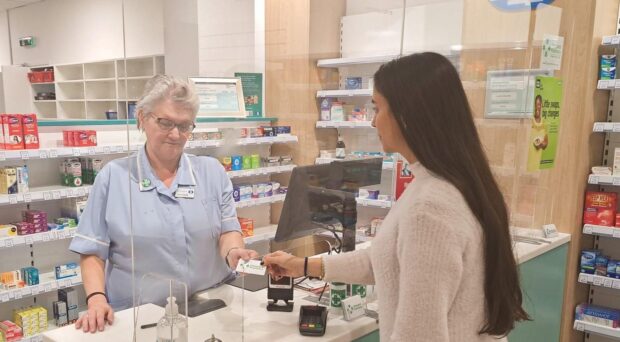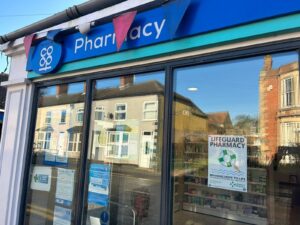
Background
5583 suicides were recorded in 2021 and about 1 in 5 people experience suicidal ideation (suicidal thoughts and plans) in their lifetimes. People who are suicidal find it hard to seek help. They may not know where to go or may doubt that anyone would understand. Stigma, feeling like a burden and, for men, pressure to conform to societal norms concerning masculinity, are also barriers.
Early intervention and capitalizing on windows of opportunity are vital. The Lifeguard Pharmacy study tests whether a community pharmacy response service would offer a discreet and accessible help-seeking avenue for people experiencing suicidal ideation and/or domestic abuse.
How did we do it?
Our study had two phases. Firstly, we delivered a co-development phase involving focus groups, interviews and/or workshops, engaging 40 lived experience and professional stakeholders to develop the intervention components.
Secondly, we conducted a 6-month non-randomized feasibility trial and process evaluation in 12 community pharmacies (eight intervention and four control) in Lincolnshire, UK.
In partnership with a pharmacy chain, we purposively selected pharmacies to include varying sizes, geography and levels of socio-economic deprivation. Monthly visits to the pharmacies by the research team monitored intervention fidelity.
The process evaluation included focus groups with trained Lifeguards, interviews with customers who use the intervention pharmacies, and a wider community survey to gauge awareness and acceptability. We also held a final feasibility workshop to gain the perspectives of different stakeholders and to explore future directions.
We have been closely guided by our Lifeguard Insight Panel which comprises six public members and a public co-investigator. We also reported study decisions, progress and results to our study steering group.
The Lifeguard Pharmacy intervention

The Lifeguard Pharmacy intervention is delivered by community pharmacy staff (including pharmacists, technicians, counter and dispensing staff) who have been trained to be ‘Lifeguards’. As Lifeguards they are either approached by customers who present a discreet Lifeguard ‘cue card’ and/or they proactively look out for customers in distress.
Adults who are experiencing suicidal ideation or domestic abuse are offered a private consultation in the consultation room. Lifeguard consultations include an initial assessment and triage. Resulting actions include supportive signposting, facilitating referrals and emergency responses, depending on the triage assessment. Comprehensive support is available for the Lifeguards, including optional sessions with a psychotherapist and a buddy system.
Outcomes
The main feasibility outcomes are whether the intervention is deliverable in different community pharmacy settings; whether the pharmacy staff and the public find it acceptable for community pharmacies to offer this service; and whether it is possible to collect research data about Lifeguard Pharmacy clients and consultations.
The study is not powered to find out what difference the intervention makes to the people who use it: this would need to happen in a further study. However, we have captured the number of consultations held, risk levels using the triage tool and number of referrals made for onward support.
Project findings

We trained 37 community pharmacy staff to be Lifeguards. During the 6-month trial period, the Lifeguards offered 24 consultations; eight for suicidal ideation, nine for domestic abuse and seven for both suicidal ideation and domestic abuse.
In addition, they used their new skills and resources to support 34 people with other issues, including mental health needs, loneliness and bereavement. Lifeguards said that the Lifeguard Pharmacy training and resources had made them more attuned to signs of distress and had increased their confidence to ask brave and difficult questions about suicidal intentions.
This study has found that it is feasible to train community pharmacy staff to identify customers who are suicidal and/or experiencing domestic abuse. Customers and staff found the intervention acceptable, considering the community pharmacy to be an accessible, discreet and informal setting for the Lifeguard Pharmacy service.
Very few Lifeguard consultations were client-initiated, however. Both staff and customers thought that further refinement and improved marketing were required for it to work effectively as a client-initiated service.
A decision needs to be made about whether to maintain a focus on suicidal ideation and domestic abuse or to widen the remit to include support for other issues that, if addressed early, can prevent escalation to suicidal ideation.
Project timeline
This project runs from 1st October 2021 to 30th September 2023. The results are currently being analyzed and written up for publication and wider dissemination.
Funding
This project was funded by the NIHR’s Health and Social Care Delivery Research programme, NIHR133132.
Project team
For further information, please contact the Principal Investigator, Professor Josie Solomon jsolomon@lincoln.ac.uk or the Joint Lead Investigator, Dr Rebecca Barnes, rb358@leicester.ac.uk
Comments